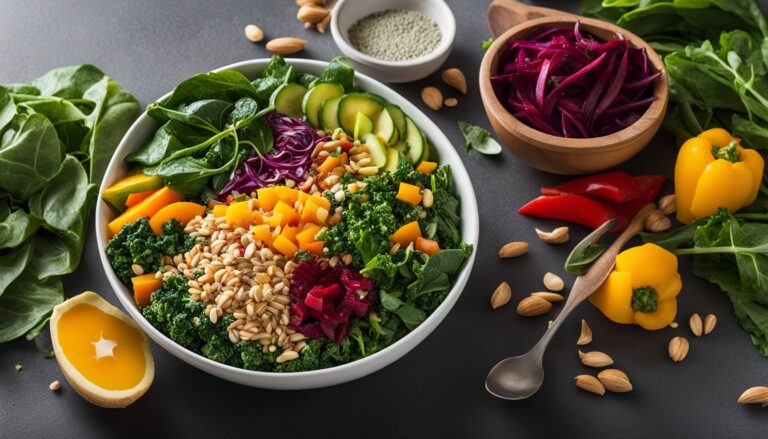Ever felt a bit bored by the cholesterol talk related to heart health? Well, get ready for a twist. Recent studies indicate that inflammation might be just as key in battling heart disease.
It’s been found that fighting inflammation even if cholesterol levels stay the same decreases heart attack and stroke risks significantly. In the JUPITER study older adults with high inflammation but normal cholesterol who took statins saw less heart attacks and strokes.
Another trial, CANTOS, showed a 15% drop in heart attacks or strokes for those with a prior heart attack and high inflammation after using an anti-inflammatory drug. Their need for big heart surgeries also decreased by 30%, pointing out the power of fighting inflammation.
Key Takeaways
- Inflammation is key in heart disease development. Lowering it reduces heart attack and stroke risks.
- Studies show working on inflammation, even if cholesterol isn’t changed, greatly cuts heart disease risk.
- Changing lifestyle habits like quitting smoking, keeping a healthy weight, and regular exercise can lessen inflammation and boost heart health.
- Eating an anti-inflammatory diet, with foods like fruits, veggies, nuts, and fatty fish, also helps cut inflammation.
- Drugs such as statins and anti-inflammatory medicines help manage inflammation and lower heart disease chances.
Inflammation and Heart Disease The Connection
New findings suggest a strong tie between chronic inflammation and a higher heart disease risk. Inflammation heavily influences atherosclerosis, a key player in heart problems. Certain markers like CD14++CD16+ monocytes, predict future heart issues. Also measuring High Sensitivity C-Reactive Protein can help both prevent and treat heart diseases.
Studies Linking Inflammation to Cardiovascular Risks
The JUPITER study revealed something interesting. It showed treating older folks with statins, even without high cholesterol, cuts down heart attack and stroke numbers. The CANTOS study went further. It found reducing inflammation, not cholesterol, lessened heart attack risks by 15% and lessened the need for surgeries by 30%.
How Chronic Inflammation Affects the Heart and Blood Vessels
Inflammation is the body’s defense turned rogue. It can damage blood vessels help plaque grow, and lead to clots, causing heart attacks and strokes. Stress can also make the inner lining of blood vessels work poorly leading to heart problems. When we lessen LDL-cholesterol, blood vessels work better, showing why fighting inflammation is key for heart health.
Conditions like rheumatoid arthritis can lead to heart problems. The development of plaque and clots involves inflammation, immunity, and infection. Not exercising can lead to poor blood vessel health and slight but forewarning inflammation, showing how lifestyle affects our hearts.
Infections and inflammation up the risk for a stroke, offering new prevention paths. Heart health benefits greatly when we tackle both inflammation and lifestyle.
Statins not only lower cholesterol but are also anti-inflammatory, benefiting our hearts. But, after procedures leftover inflammation is a worry stressing the need to fully address inflammation for further heart health.

Three out of five people worldwide die from a disease connected to inflammation.
Fight inflammation to help prevent heart disease
You can lower your heart disease risk by making smart choices. Eating right, exercising, and reducing stress all help.
Start by eating foods that fight inflammation like omega-3 and antioxidant-rich foods. For example, curcumin in turmeric can lower signs of inflammation. This includes markers like CRP. People with diabetes and breast cancer might also see benefits from adding ginger to their diet.
Working out keeps your heart and body healthy. Both cardio and strength training are key. They lower inflammation and make you feel better overall.
- Eat a Mediterranean diet with lots of fruits, veggies, and healthy fats to keep inflammation low.
- Stay away from processed foods and bad fats. They can make inflammation worse.
- Use methods like meditation or yoga to manage stress. This helps keep inflammation in check.
- Keeping a healthy weight is important. It stops visceral fat from causing inflammation.
By sticking to these habits you can get a handle on inflammation and heart disease.

Chronic inflammation is linked to several conditions like heart disease, diabetes and cancer.
Anti-Inflammatory Diet for Heart Health
Keeping a heart-healthy diet is key to fight inflammation and protect your heart. It’s best to eat whole, unprocessed foods like fruits veggies, whole grains, and nuts. These items help lower the chance of heart disease. Fast and processed foods, though, can cause inflammation and should be skipped.
Antioxidant Rich Foods to Include
Eating foods rich in antioxidants helps battle ongoing inflammation. Berries greens, and omega-3 rich fish are great for reducing inflammation.
- Berries strawberries, blueberries Rich in anthocyanins and resveratrol which have anti-inflammatory properties
- Leafy greens spinach kale High in potassium, magnesium, and vitamins, they fight inflammation
- Fatty fish salmon, mackerel Their omega-3 fatty acids fight inflammation
- Nuts and seeds walnuts, flaxseeds They offer omega-3s, good for inflammation
- Olive oil Rich in anti-inflammatory compounds like oleocanthal
- Garlic Offers an array of health benefits including anti-inflammation
- Turmeric Rich in curcumin, an anti-inflammatory compound
Avoid Processed and Inflammatory Foods
It’s important to stay away from processed and inflammatory foods for a healthy heart. This means no red meat, processed meat, or sugary baked goods. Choose cooking methods like bake, steam, or quick stir fry for less inflammation.
Choosing an anti-inflammatory diet with lots of antioxidants and cutting down on processed food is a great move for your heart.

Eating a diet focused on whole, nutrient-dense foods can go a long way in reducing inflammation and lowering your risk of heart disease. Registered Dietitian
| Anti-Inflammatory Foods | Inflammatory Foods to Avoid |
|---|---|
| Fruits berries, citrus, avocado | Processed meats bacon, sausage |
| Vegetables leafy greens, peppers, mushrooms | Fried foods |
| Whole grains quinoa, brown rice | Refined carbs white bread, pastries |
| Fatty fish salmon, mackerel | Sugar-sweetened beverages |
| Nuts and seeds | Processed snacks chips, cookies |
| Olive oil, garlic, turmeric | Alcohol in excess |
Exercise to Reduce Chronic Inflammation
Doing exercise can help a lot in battling chronic inflammation a major heart disease risk. A Harvard Medical School study found that muscle inflammation from working out boosts T cells. These T cells help muscles use energy better and boost stamina in mice.
When mice ran on treadmills they showed signs of inflammation. Their gene activity for metabolism and levels of inflammatory chemicals were higher than those in inactive mice.
In both groups of exercising mice, T cells lessened muscle inflammation. Consistent exercisers gained the most benefits. Tregs helped reduce inflammation from exercise. They also lessened muscle damage changed muscle chemistry, and enhanced muscle performance.
A walk, even if it’s just brisk, can lower inflammation. Evidence points to a 20-minute walk reducing swelling in the body. Exercises that use your own body weight can make muscles stronger without harming joints. In older adults, weight training slows down swelling reactions.
Mobility exercises, like using a foam roller for SMR, boost joint flexibility and muscle work.
Biking, either outdoors or on a stationary bike is good for those with joint and arthritis pain. This is because it’s gentle on the body.
Adding exercise to your daily life can cut your heart disease risk a lot by fighting inflammation. Animals without T cells suffered more muscle swelling and had worse fitness than those with T cells. It turns out a substance called interferon drives chronic swelling. In mice without T cells, interferon limits energy production. This leads to poor fitness. But stopping interferon can fix these issues in these mice.

By being active regularly you use your body’s own defenses to lower long term swelling and boost heart health.
Exercise is the best defense against chronic inflammation and its harmful effects on the heart and blood vessels.
Manage Stress for Lower Inflammation Levels
Chronic stress is bad for our heart. It makes our body more inflamed. This can mean higher chances of heart problems like high blood pressure. It can also lower our good HDL cholesterol. Strikingly, people under stress might have more sticky blood. This can up their stroke risk. But, activities that bring peace can lower our stress. They in turn, protect our heart health.
Mind-Body Practices for Stress Relief
Meditation, yoga, and deep breathing are great against stress. They calm the mind and body. This can reduce inflammation. And simpler actions like meditating or just listening to music work too. Moving your body whether walking in nature or doing yoga, also helps. It eases stress tension, and bad moods
.
Living well helps against stress, too. Good sleep and friends are key parts. Adults need seven to nine hours of sleep every night. Enough rest keeps inflammation low. Plus, having people close to you who support you makes a big difference. It cuts stress and fights against heart disease.
Don’t be afraid to get help for chronic stress. Health professionals can find what’s stressing you. They can teach you to handle it better. Relaxation and stress management classes can also be very useful. They are available at many places from community colleges to hospitals.

Using these mind-body practices can really improve your heart’s health. Don’t forget, your mental health is as important as what you eat and how active you are. This is vital in avoiding heart problems.
Medications and Inflammation Markers
Lifestyle changes are key to curb chronic inflammation. But, some drugs help too. Statin drugs, for example, lower cholesterol and fight inflammation. This helps cut the risk of heart disease. New anti-inflammatory drugs are also under the spotlight. They might offer extra heart benefits.
Role of Statins and Anti-Inflammatory Drugs
If inflammatory markers like high-sensitivity C-reactive protein CRP are high, it’s a warning for heart risks. Statins can lower these markers, protecting the heart. Also drugs such as aspirin fight heart disease by reducing inflammation.
| Inflammation Marker | Significance |
|---|---|
| High-sensitivity C-Reactive Protein CRP | A sensitive marker of inflammation and tissue damage. Levels above 3 mg/L predict more ischemic episodes and the need for revascularization procedures. |
| Fibrinogen | Associated independently with various cardiovascular endpoints in unhealthy and healthy patients. Smokers have twofold higher concentrations than nonsmokers. |
| Erythrocyte Sedimentation Rate ESR | An inflammatory marker that has been associated with cardiovascular mortality and morbidity. |
| Interleukin-6 IL-6 | An inflammatory cytokine that has been linked to cardiovascular events and arterial stiffness. |
Watching inflammation markers helps spot high-risk patients. Doctors could then opt for stronger treatments. This involves weight loss, exercise, and lipid lowering. Combining lifestyle changes with medical help is great for fighting chronic inflammation. And it boosts heart health.

Inflammation is a key driver of many chronic diseases, including heart disease. Adressing it through lifestyle shifts and medical care is crucial for enhanced health.
Lifestyle Changes for Combating Inflammation
Changing your diet and exercising can help reduce chronic inflammation. However, quitting smoking is essential. It’s a big step with huge benefits for your heart.
When you quit smoking, you cut your heart disease risk in half. Other good habits help too. These include staying at a healthy weight, sleeping well, and managing stress.
Eating the right foods also fights inflammation. Include omega-3 rich fish olive oil, turmeric, and ginger in your meals. Yet stay away from processed foods and too many sweets. These can make inflammation worse.
A mix of a good diet, exercise, stress control, and no smoking is the best approach. It helps lower inflammation and guards your heart.
Lifestyle modifications such as stress management and adequate sleep are essential to combat inflammation and improve overall health.
Maintain a Healthy Weight to Prevent Visceral Fat
Having extra weight, especially around your belly, boosts heart disease risk. Visceral fat is the main issue. It’s hidden deep in the abdomen and produces substances that can harm the heart.
To lower this risk stay at a healthy weight. Eat well and exercise regularly. This keeps visceral fat in check, lowering heart disease chances.
It’s very important to stay at a healthy weight for your heart’s sake. Being overweight or obese makes you more likely to die from heart disease. A healthy waist-to-height ratio shows heart risks better than just weight alone. Even people of normal weight can face heart failure if they have metabolic syndrome.
To fight visceral fat and inflammation, eat foods that fight these issues. These include omega-3s and foods rich in antioxidants.
The Mediterranean diet is a good model to follow. Steer clear of processed and inflammatory eats. Combine this diet with cardio exercises and stress reduction. Thus, you strike at chronic inflammation and help your heart.
- Visceral fat raises the risk of type 2 diabetes, insulin troubles, heart illness, and specific cancers.
- A low-carb diet can cut visceral fat more than a low-fat one.
- Heart-pumping exercises slash visceral fat, especially moderate and intense ones.
- Adding 10 grams of soluble fiber daily can reduce how much visceral fat you gain.
- Eating more protein is linked to less visceral fat and a healthier weight.
- Cutting back on sugar and watching alcohol can prevent visceral fat build-up.
- Trans fats, usually in processed foods, are bad for your heart and add to visceral fat.
Moreover, studies show changes in lifestyle, like working out, can cut down on too much fat in the wrong places. This better body composition can help overweight and obese folks.
Mixing aerobic and lifting workouts can really shrink belly fat in women of a certain age. Staying fit and following these health tips guard your heart and all over health.
Conclusion
It’s key to reduce inflammation to prevent heart disease. Ways to do this include eating an anti-inflammatory diet and working out regularly. Managing stress and keeping a healthy weight are also important.
By adding these habits to your life, you can keep your heart health strong. Such choices lead to lasting benefits.
Focus on an anti-inflammatory diet that includes rich antioxidant foods. Start with green leafy veggies, yellow veggies, whole grains, and drinks like coffee, tea, and wine. Stay away from processed and inflammatory foods, though. This means avoiding refined grains sugary drinks, and processed meats.
Adding omega-3 fatty acids to your meals helps, too. So does following a Mediterranean diet. This diet boosts your body’s ability to fight inflammation.
To help even more, join and move your body. That’s exercise. Also, find ways to manage stress that work for you. Mind body methods are a good start.
These moves, like eating well, working out, and managing stress, cut down inflammation. This in turn lowers your chances of getting heart disease. So, protect your health for the long haul by making these choices.





